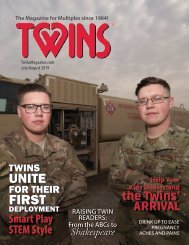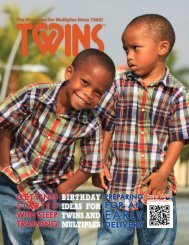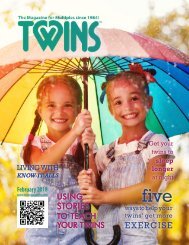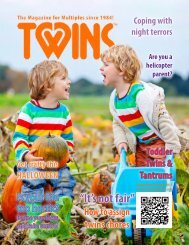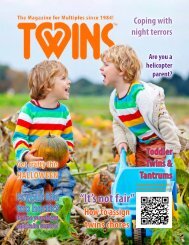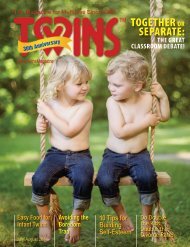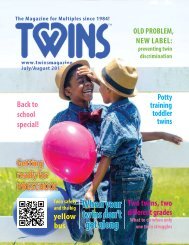Twins Magazine 2004 January February
Canadian family with four sets of twins sets Hardwired to Connect HMO forced to pay for TTTS surgery Holiday Survival Guide Oh my word! RSV season symptoms and strategies Sparkling Snowflakes The best-laid plans The hamster project Those “loving feelings” are hard to find Twins galore Two treatments help TTT babies Uh-oh! Toddler Trials and Training What causes monozygotic twinning Whining wears on single mom Help! I need somebody…
Canadian family with four sets of twins sets
Hardwired to Connect
HMO forced to pay for TTTS surgery
Holiday Survival Guide
Oh my word!
RSV season symptoms and strategies
Sparkling Snowflakes
The best-laid plans
The hamster project
Those “loving feelings” are hard to find
Twins galore
Two treatments help TTT babies
Uh-oh! Toddler Trials and Training
What causes monozygotic twinning
Whining wears on single mom
Help! I need somebody…
Create successful ePaper yourself
Turn your PDF publications into a flip-book with our unique Google optimized e-Paper software.
"Hardwired" continued from page 25
my children any religious training; I want them to decide for themselves
when they grow up,” Kline replies that there is no evidence that providing
religious guidance to children limits their ability to choose. Adults tend to go
through a process of reappropriating their parents’ religion for themselves,
or they find an alternative.
Beyond a means to seeking transcendent meaning in life, religious communities
serve as an important authoritative community. For those that
meet on a regular basis, members see children over a period of time and
develop a relationship commitment to children who are not their own.
“They develop a shared parenting community. Parents need reinforcement
from other adults and parents,” Kline said.
Strengthening the family and being part of religious and civic communities
can help restore the nurturing that kids need but, to a large extent,
haven’t been getting.
“ versus nurture is a dance.
What this report finds is that nature
”
What does this mean to parents?
For a start, the authors of the report hope to raise the level of self-awareness
in families. “We are trying to effect a level of cultural change, with adults
mostly, beginning with parents, neighbors and extended family. We want
them to recognize the importance of the deep and enduring relationships
with their children,” Kline said. Those relationships are lived out differently
in different families.
“A basic premise is, our mere physical presence with each other counts;
we are soothed by the presence of those who love us and part of that is
manifested in biochemical communication from one person to another,”
Kline said.
Twins, and families with twins, are experts on bonding and enduring relationships.
Certainly, the twin relationship is unique and can be a buffer to a
broken family, yet twins have the same deep needs for authoritative communities
that others have. In fact, authoritative communities can help twins
venture outside their twinship.
If change of the culture begins at home, how do families change? Step
by step, according to Kline. “How do individuals change? How do
groups change?
“Take a deep breath and bring some things to consciousness,” she
explained. “Hear, hear, hear. Reflect. Ask, ‘If I should change, then how?’
Interventions… turn off the TV. Rituals are an enormous aid to us in doing
some of these things to support and restore relationships. Place a big
emphasis on inviting family and neighbors into the home—all year, not just
at the holidays.
The report is a wakeup call for change in areas we may have discounted
in the past few decades, not a stand-alone cure-all.
“What this report finds is that nature versus nurture is a dance.You’re going
down the wrong track if you think it is just one or the other. Most behaviors
are combinations of environment and genetics,” Dr. Kline summed up.
“What this report doesn’t say is, if we all become loving families and
part of authoritative communities there will be no drug abuse, etc. This
is no magic pill; we can’t write a prescription. But a parent who is willing
to be clear and firm, or a neighbor who keeps an eye on a kid can make
a difference.”
Divorce is not always the
only answer
Imperfect Harmony: How to Stay Married for the Sake
of Your Children and Still be Happy (St. Martin’s
Press, 2003, 235 pages, $23.95)
For many parents, the
reality of marriage does
not match their expectations.
This may be especially
so for parents of
twins. The good news,
according to author Josh
Coleman, Ph.D., is that
you can be happy despite
marital strife.
Dr. Coleman describes
his book: “There are a lot
of books on how to have
a great marriage. This
isn’t one of them. This is a book about
how to live a happy life, regardless of the state of
your marriage.” He adds that neither is this a book
against divorce, which is sometimes unavoidable.
Dr. Coleman challenges readers to rethink our
culture’s take on marriage and divorce. It is not
essential to your children’s happiness that you have
a great marriage, he writes. But he also assures
you that feeling hopeless and discouraged isn’t
proof that your marriage is flawed or your happiness
is doomed.
In his easy-going style, Coleman cuts to the heart
of the matter at hand. He offers down-to-earth advice
that really works to parents who don’t want to end
their marriage. He carves out concrete suggestions
that can help you reduce out-of-control conflict and
let go of the fairy-tale idea of marriage for a better
reality. He helps you deal with messages from the
past, living with a depressed partner, a less-than-satisfactory
sex life, making changes and much more.
Many marriage manuals offer vague advice, but
Coleman offers very practical, concrete, down-toearth,
straight talk. One piece of advice struck me as
particularly valuable. Many times couples wait for the
right mood to strike, rather than focusing on behavior.
Reach out to your partner, even if you don’t feel
like it at the moment, Coleman advises. You’ll find
many more kernels of advice that you can use, in and
beyond your marriage.
I laughed, I said “yes,” and I marveled at the rich
advice. You will too. If you enjoy Dr. Coleman’s TWINS
Magazine column, “Married with Twins,” you will love
his book.
—Sharon Withers
26 JANUARY/FEBRUARY 2004 www.TwinsMagazine.com





